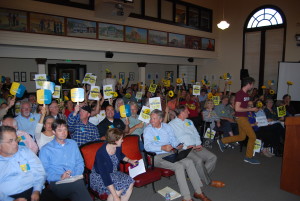
Valero Crude-By-Rail proponents and opponents fill Benicia City Hall in September to hear the City Council’s decision on the project. (Photo by Donna Beth Weilenman/Martinez News Gazette)
(The last of the Herald’s articles focusing on the big Benicia stories of 2016 will be focusing on the biggest one of all.)
Valero Benicia Refinery’s three-year battle to have its crude oil delivered by train rather than by boat came to an end in 2016. The year saw perhaps the biggest wave of developments for this much-debated proposal.
The project, which aimed to extend three Union Pacific Railroad road tracks onto Valero’s property in Benicia to deliver North American crude oil by train, was publicly announced in Feb. 2013 and was expected to be completed by the end of that year. However, strong opposition by residents and environmental groups triggered a debate that persisted over the ensuing three years. Opponents of the project contended that the project would have increased air pollution, fueled climate change, increased greenhouse gas emissions and would been very dangerous in the event of a train explosion- particularly in the wake of an oil train explosion in Quebec shortly after the project was announced as well as numerous others since. Meanwhile, supporters of the project argued that it would have created temporary jobs in the construction of rails and permanent jobs in the operation of the project, provided $30,000 in tax revenues, operated under current air permits with Bay Area Air Quality Management District and reduced dependence on oil from the Middle East.
The year began with the release of the Final Environmental Impact Report, which was meant to act as the absolute draft of the document that addressed the project’s potential effects on the environment. It also included the thousands of letters that resulted from the release of the previous Draft Environmental Impact Report and Revised Draft Environmental Impact Report. This document can be viewed at http://www.ci.benicia.ca.us/index.asp?SEC=B7EDC93A-FFF0-4A14-9B1A-1C8563BC256A&DE=26D88AB1-BB3F-4FF2-9924-D38F31BA0EA4&Type=B_BASIC.
Then came the Planning Commission hearings in February. The hearings were scheduled over the course of four straight days to accommodate all of those who wished to speak. Following the conclusion of public comments on Feb. 11, the Commission voted unanimously to deny a permit for the project. On Feb. 29, Valero appealed the decision, stating that the commission’s decision was based on grounds preempted by federal law.
A series of City Council meetings were held throughout March and April to determine whether the permit should be denied or if the council should wait until Valero could obtain a declaratory order regarding federal preemption from the Surface Transportation Board (STB). Many residents as well as environmental experts and Union Pacific representatives spoke at the meetings, and Attorney General Kamala Harris submitted a letter to the city noting that the Planning Commission and City Council have a right to deny the project. Ultimately, the council voted 3-2 to grant Valero’s request for a delay. Councilmembers Mark Hughes, Alan Schwartzman and Christina Strawbridge voted in favor of the delay, while Mayor Elizabeth Patterson and Councilmember Tom Campbell voted against it. Valero was given until September to submit its response from the STB.
Then in June, a Union Pacific oil train derailed over the Columbia River Gorge near Mosier, Ore. Of the 96 cars, 15 had derailed and several caught fire and burned for more than 14 hours, and 42,000 gallons of oil were spilled, some of which went into the Columbia River. There were no injuries, and Union Pacific agreed to new safety measures in December.
Due to the cars being the same models proposed by Valero for its project, protesters gathered for a demonstration ahead of the June 7 City Council meeting. The incident turned out to be “a game changer” for at least one councilmember. Strawbridge remarked at a candidates’ forum in September that it would be “very difficult” for her to approve the project.
Then came the Sept. 20 council meeting. Hours before the meeting, the STB had sent a letter denying Valero’s request because the refinery was not a railroad company and thus could not claim federal preemption. When the time came for the council to make a decision, Patterson and Campbell upheld their votes from April, Strawbridge made good on her earlier stated decision to not approve the project and Hughes and Schwartzman also voted to deny, making the decision unanimous. At its Oct. 4 meeting, the council adopted a resolution officially denying the project.
One question still remained among residents after the decision: would Valero sue the city as a result? That question was answered in December when City Attorney Heather McLaughlin announced that the refinery would not sue, citing the need to maintain good relations with the city. Patterson expressed her pleasure with the decision in a statement provided to the Herald.
“I look forward to the promise of those good community relations now that we can put this saga behind us,” she said. “There are many opportunities for us to work together, such as the locations and operations of the local air monitoring that the BAAQMD will be implementing. We share Valero’s concerns of new residential development on the so-called Seeno site to avoid conflicts. And lastly I look forward to Valero’s proactive participation on our Community Sustainability Commission.”






Leave a Reply